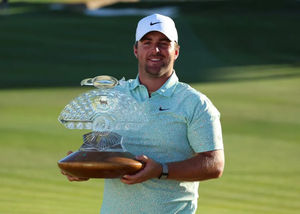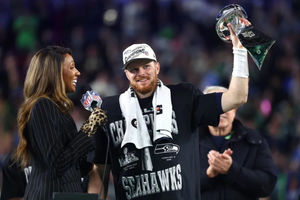It's Time For Phil Jackson To Get The Hell Out Of Here
 Bryan Bedder/ [object Object]
Bryan Bedder/ [object Object] Phil Jackson wasn’t content to just watch all his major offseason moves combust in his face. Instead, he took all these failures as evidence that he needed to double-down on his personal fetish, the triangle.
It’s hard not to feel bad for Jeff Hornacek, who I assume gave this quote with a razor pressed to his throat:
Jeff Hornacek confirmed Tuesday that management is using the remaining months to evaluate who fits the system, which has been re-emphasized as more of a traditional triangle since the All-Star break. Hornacek even made it sound like they were placing players into two different hats: the triangle yays, and the triangle nays.
“As time goes on, you say can they get it? Are they getting better at it? If they’re not, you go, OK,” Hornacek said. “End of the year comes and we’re having our discussions and you say, ‘Can this guy play this offense? We’ll say either yay or nay or he’s getting it, he’s getting better. So I’m sure that’s part of evaluations this summer.”
That’s misguided in plenty of ways, but chief among them, as many have noted, is the misunderstanding of priorities. The Knicks offense is ranked 14th in offensive rating and scores 105.8 points per game, solidly middle of the pack. They show brief flashes of competence off the pick-and-roll. Kristaps Porzingis and Willy Hernangomez, the only chunks of the roster worth building around, have promising chemistry. Meanwhile, their defense, run by the astute basketball mind belonging to Kurt Rambis, sits at 25th in defensive rating, producing a constant churn of lowlights. But Phil Jackson still believes that the most pressing priority is to sift the whole roster into two buckets based on their ability to play a particular offense that no successful team has relied on in over a decade.
It’s one thing to prioritize rejiggering the Knicks’ decent offense over their horror-show defense, but it’s basketball malpractice to insist that the offense and roster be tweaked to suit the triangle in particular, as opposed to, you know, general good basketball principles. But for the sake of argument, let’s assume that the triangle really is the fix the Knicks need (it isn’t) and that it has the potential to turn their offense into a spectacular one. Even then, what Phil Jackson has done with this team still makes no sense.
If the triangle is the way to win basketball games, why did Jackson choose to re-sign Carmelo Anthony, whose ball-stopping tendencies he can’t stop publicly bitching about and yet claims to have understood all along? Maybe there’s nothing as quintessentially Phil as this gnomic tweet where he tries to have it both ways. He poses as the experienced, enlightened basketball mind who wasn’t at all duped by Anthony’s development; he knew knew exactly the immutable iso player Carmelo was and didn’t like it... and yet, still proceeded to offer him a five-year, $124 million contract. With a no-trade clause, too, to make sure he says extra-stuck. Who forced you to do this, Phil?
If triangle was what he cares about, why were two of his big offseason moves aimed at picking up two more ball-dominant guards, Derrick Rose and Brandon Jennings? Even after they played about as well as anyone could have reasonably expected—expectations should not have been high for a hobbled D-Rose and a never-actually-good Jennings—he waived one, failed to deal the other, and is reportedly considering waiving that guy, too. Why bring them on at all? It’s an odd choice, at least according to what he said in 2012 on the subject of point guards:
This idea of the point guard dominating the ball is a relatively new idea in the game of basketball, really. … One of the things that’s pretty obvious [about my coaching career] is that I never had to fight to get a dominant point guard. Because once you do that, defenses can align themselves against that one guy. You can pressure the point guard high on the floor and move the ball away from whomever you want to shut down. That was always my defensive philosophy against people like Isiah Thomas and John Stockton.
Okay. That’s fair. But maybe he liked the specific style of point guard that Derrick Rose is, and he figured Rose was a good enough player that he wanted to see if he could make it work in his system? Back to Phil:
The problem with the Triangle is that you have to teach the most basic, basic skills: Footwork. Where you stand on the floor. And if you have the kind of player who wants to attack and score every time he touches the ball, he will hurt this offense.
Ah. But maybe Rose himself was willing to change?
“I want pick-and-roll every time down,” Rose said after his 17-point, one-assist performance on Tuesday night.
That was back in October. Maybe he’s come around to it since:

This all sums up Phil’s most infuriating fixation: commitment to an abstract principle over actual personnel. He cares more about the Triangle than the real breathing humans he signs—that he himself signs! no one else is signing these people!—to the roster. So long as Phil stays yoked to this particular unpopular scheme rather the modern principles of spacing, ball movement, and positional versatility that seem to prevail on all successful teams in 2017, he’ll continue to thrust this team deeper and deeper into the trash can.
Here’s a plan Jackson would be much better served enacting: Look at the actual players he has, some of whom are extremely good, and figure out how to build a team that wins games around those players. Kristaps Porzingis, a 21-year-old giant with a shot-blocking and range-shooting skillset that perfectly aligns with the medium-term evolution of the league, is sitting right there. To have a player like that and not prioritize building a roster around his skills is a tremendous feat of mismanagement. Organizations that win consistently understand how to adapt to the talent they have (hello, Spurs); Jackson seems to believe it is the duty of the talent to adapt to his obsessive pursuit of retro.
And so here the Knicks are, stumbling through the last weeks of an ill-advised “Win now!” season with an unhappy veteran star, an increasingly somber young stud, and whatever debris the Bulls scattered in the refuse pile. This was a wasted season in terms of on-court success, and now Jackson’s return to the altar of the triangle all but guarantees it will be a wasted season in terms of player development. The roster will apparently be culled and the potential free-agent pool drained in order to satisfy Jackson’s dim vision, and the team will head into next year having to learn a new system yet again.
What now? Under Jackson’s supervision, one of the world’s best cities has been rendered a toxic basketball wasteland. Who in this free agent class is suddenly perking up now that they’ve heard Phil wants to shove the triangle back down his players’ throats? The Knicks cannot afford to make New York an even less palatable destination, but of course Jackson couldn’t understand this. It’s just one of many plain truths—that you shouldn’t antagonize your star player in public (even if that what worked on MJ), that you shouldn’t give up useful players to overpay hurt veterans, that you should stay attuned to how the league is transforming, that you should pay attention to the generational talent staring you in the fucking face—that he can’t get through his big dumb head. This dude has got to go.
Related
Why Alabama vs. Ohio State Must Happen as Scheduled
The NBA’s Tanking Problem Is Getting Worse — Not Better
NBA Picks Tonight: Three Best Bets Before the All-Star Break
- Best NBA Betting Picks for Wednesday Feb. 11th Slate
- Early Super Bowl LXI Odds Favor Seahawks, Sleeper Betting Picks & More
- Sunday Feb 8th NBA Picks: Three Best Bets Today
- Super Bowl Betting Preview: Seahawks vs. Patriots Breakdown & Pick
- The Most Fun Super Bowl Prop Bets You Can Make This Year
- Super Bowl 60 Prop Bets: 10 Best Bets for Patriots vs. Seahawks
- UFC Fight Night at the Apex Best Betting Picks and Predictions












